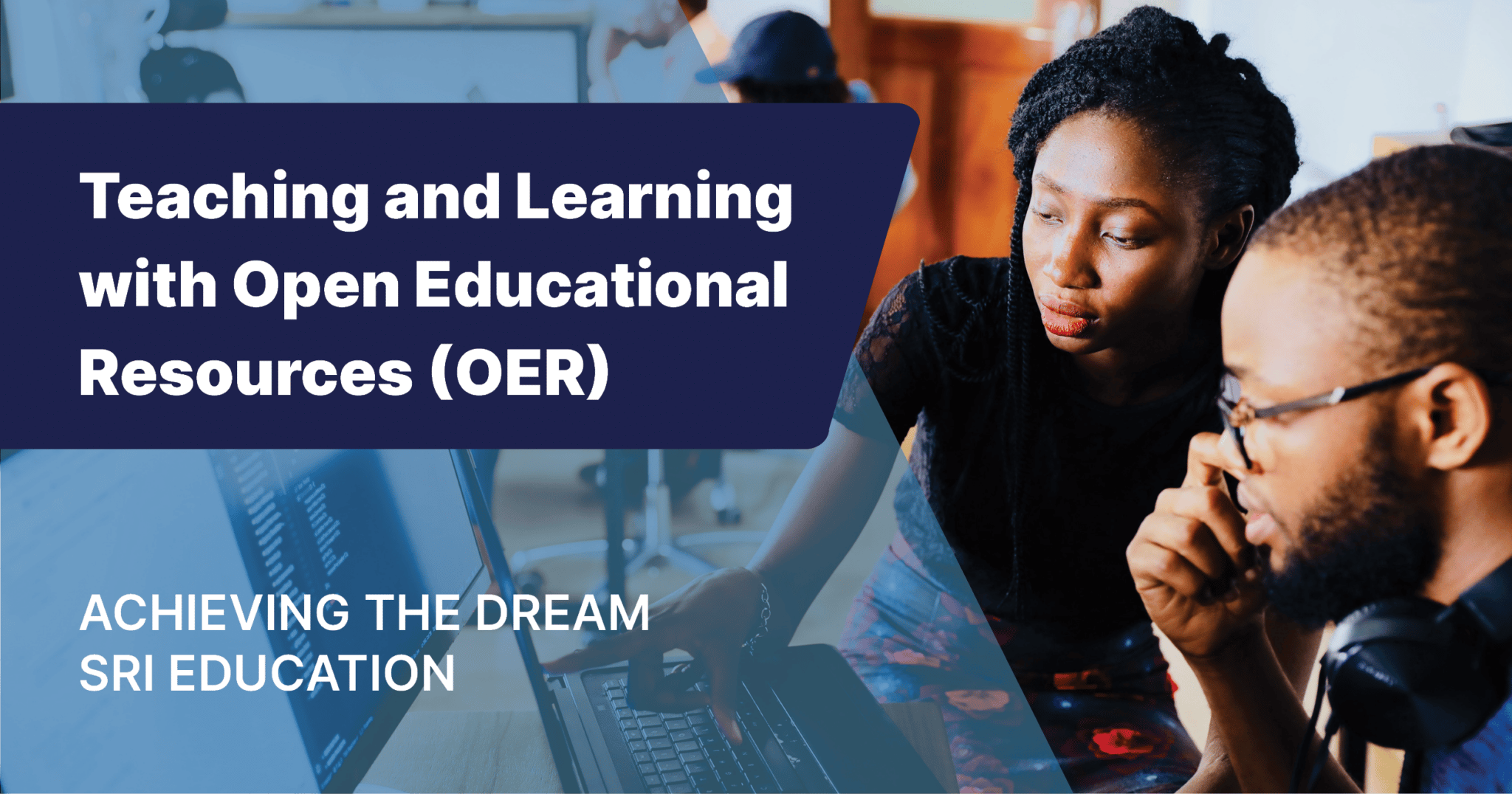Open educational resources (OER)1 have saved students millions of dollars in textbook costs and made significant inroads in the college textbook market. One study found that in the 2018–19 academic year, 14% of faculty overall reported assigning OER as course materials, rising to more than 25% of faculty teaching introductory courses.2 With free and open access to course materials, students can use the money they save for other courses or personal expenses, and they do not risk falling behind if they hold off on purchasing required textbooks.3
What are open educational resources?
OER are openly licensed materials that can be freely used and repurposed by others. The open intellectual property license permits their free reuse, revision, and redistribution.4
These concrete benefits of OER tend to attract the most attention, but what about other less tangible — and potentially more transformative — benefits to instructional practice and students’ learning experiences that can come with the flexibility and creativity unleashed when instructors transition to OER?
From 2020 to 2022, SRI International (SRI), in partnership with Achieving the Dream (ATD), investigated ways OER can enable open and culturally responsive teaching practices.5 These practices include giving students agency over their learning, including diverse voices in the classroom, creating opportunities for new knowledge generation, connecting course concepts to real-world issues that matter to students, bringing a critical lens to course topics, and building safer and supportive classroom cultures.
Changing instructional practice in this way can have profound effects for students and faculty, but the changes do not happen automatically by the mere adoption of OER. In fact, they are unlikely to happen at a meaningful scale without a concerted effort by institutions.6
Faculty members encounter numerous barriers to adopting open and culturally responsive teaching practices, which takes time and may seem risky when faculty worry about covering required course content and having the support of their colleagues. Further, students themselves may resist unfamiliar expectations for engagement and critical discussion.
To overcome these barriers, faculty need support. OER programs should focus not only on adopting new materials but also on shifting pedagogy, building communities of practice, and connecting OER efforts with other campuswide initiatives to elevate teaching and learning and increase diversity, equity, inclusion, and accessibility.
A new partnership between the Tennessee Board of Regents, ATD, and SRI offers the opportunity to learn what impact these kinds of institutional supports can have. With support from the William and Flora Hewlett Foundation, we are investigating whether the intentional design of professional learning opportunities and other supports can lead to meaningful change in instructional philosophy and practice. Based on the first year of the study, the answer so far is — yes.
Last year, 11 teams of faculty members and support staff from eight colleges and universities across Tennessee redesigned 12 courses with OER and open and culturally responsive practices. The teams engaged with several new tools and resources: a summer institute led by ATD centered on using OER-enabled open and culturally responsive practices, ongoing coaching from ATD, and a framework developed by SRI that maps ways to implement open and culturally responsive practices across the components of a course.7 SRI researchers then collected data about the first semester of teaching the redesigned courses.
Early evidence suggests that incorporating pedagogical principles and practices into an OER program provided instructors inspiration for ways they could maximize the transformative potential of OER.
Based on weekly logs instructors completed about their instructional practice, we found that they consistently applied open and culturally responsive practices during the spring 2023 semester. They reported using these practices in most weeks in which they taught their courses. Most prominently, they included diverse authors and brought a critical lens into their instructional materials. They also incorporated opportunities for students to have agency over their learning — such as by choosing discussion or assignment topics — and to work collaboratively to generate new knowledge.
Interviews with instructors revealed that they experienced a different way of teaching. One sociology professor said, “Education doesn’t have to be this oppressive place where you follow orders, where you are in trouble if you don’t comply. Education, like [the] workplace and family, can be much more democratic. You can create social systems where you get significant say in what happens.” A Spanish professor said, “I learned you can’t plan everything out because open educational practices [are] about being responsive to students.”
While we have not yet systematically examined the impacts of taking a redesigned course on students’ experiences and grades, focus groups with students revealed noteworthy themes about their course experiences. Students reported feeling supported and included through interacting with materials that represented their culture and ethnicity. They felt seen by their instructors and treated as if they were part of a collaborative learning community. Students also appreciated that there could be more than one “right” way to solve a problem and having the opportunity to “build a class” together.
We cannot be sure how much the OER program can be credited with these positive experiences, given that faculty self-selected into the program, indicating an openness to new ways of teaching. Some of the instructors we interviewed emphasized that they had used culturally responsive practices for years.
Additionally, some instructors ran into challenges, especially teaching required courses such as math to students who were still struggling to recover from various impacts of the COVID-19 pandemic. Instructors mentioned difficulties in generating deeply reflective discussion in asynchronous courses, covering necessary content, and trying to transform their courses in a short period of time. One instructor suggested it would be helpful to have more frequent cross-institution cohort check-ins and a minimum of two teams per college to offset feelings of isolation.
Still, early evidence suggests that incorporating pedagogical principles and practices into an OER program provided instructors inspiration for ways they could maximize the transformative potential of OER. In fall 2023, we will delve deeper into the impacts on students’ academic and socioemotional outcomes in a select set of courses.
Footnotes
[1] Andrade et al. (2011). Beyond OER: Shifting Focus to Open Educational Practices. Open Educational Quality Initiative. http://citeseerx.ist.psu.edu/viewdoc/download;jsessionid=3E791F43CBAA981EEE4A5A15406C49A6?doi=10.1.1.590.4092&rep=rep1&type=pdf.
[2] Seaman, J. E., & Seaman, J. (2020). Inflection point: Educational resources in U.S. higher education, 2019. Bay View Analytics. https://www.bayviewanalytics.com/reports/2019inflectionpoint.pdf.
[3] Griffiths, R., Mislevy, J., Wang, S., Ball, A., Shear, L., & Desrochers, D. (2020). OER at scale: The academic and economic outcomes of Achieving the Dream’s OER Degree Initiative. SRI International. https://achievingthedream.org/oer-at-scale-the-academic-and-economic-outcomes-of-the-oer-degree-initiative/.
[5] Griffiths, R., Joshi, E., Pellerin, E., & Wingard, A. (2022). Teaching and learning with open educational resources (OER). SRI International. https://achievingthedream.org/teaching-and-learning-with-open-educational-resources/.
[6] Griffiths et al. (2020).
[7] Griffiths et al. (2022).
More About OER
Achieving the Dream is actively exploring how the adoption and implementation of open educational resources (OER) affect equity, access, and the student experience in higher education. Contact us to talk with our team about how we can support your Teaching & Learning efforts.

